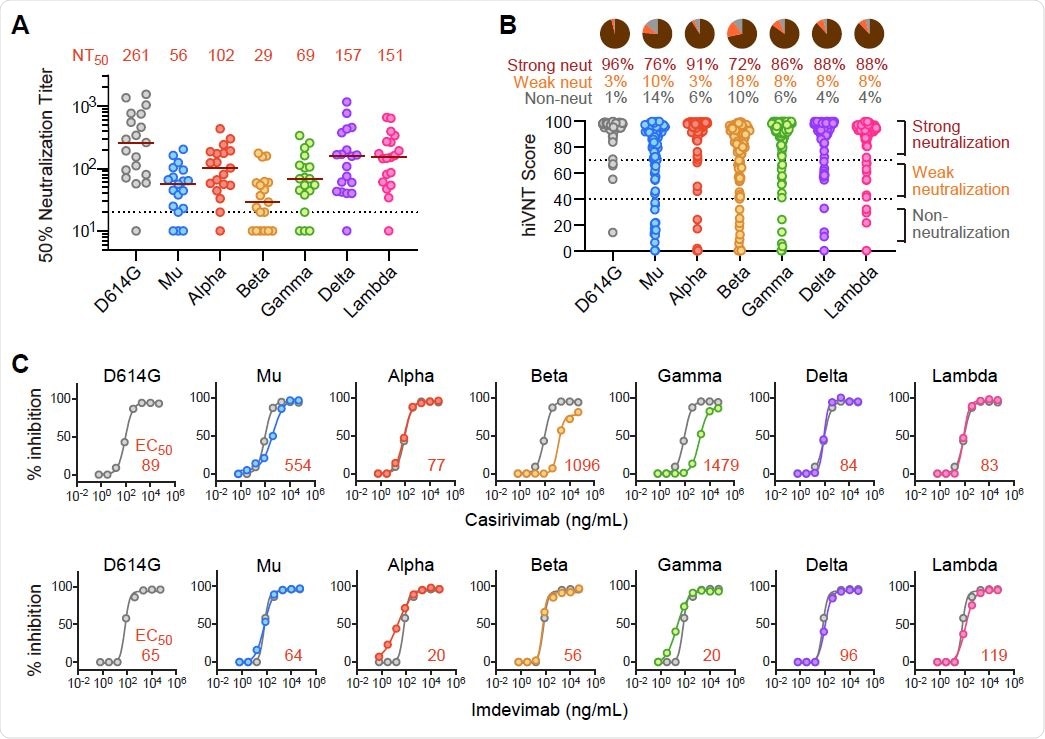Researchers in Japan have conducted a study showing that the vaccine developed by Pfizer-BioNTech to protect against coronavirus disease 2019 (COVID-19) seems to be adequately effective against the B.1.621 (mu) variant of severe acute respiratory syndrome coronavirus 2 (SARS-CoV-2).
The mu variant, which has been classified by the World Health Organization (WHO) as a variant of interest, has recently triggered concerns after reports indicated that it exhibits increased immune escape capabilities compared with other variants of concern and interest.
A team from Yokohama City University School of Medicine and Yokohama City University Hospital has conducted a study showing that Pfizer-BioNTech’s BNT162b2 vaccine is 76% effective at neutralizing the mu variant.
The dual monoclonal antibody cocktail containing casirivimab and imdevimab also effectively neutralized the variant.
The study also found that the mu lineage causes cell-to-cell fusion, which can be a factor in promoting escape from vaccine-induced humoral (antibody) immunity.
However, Kei Miyakawa and colleagues say that although mu could become problematic if it replaces the B.1.617.2 (delta) lineage as the predominant variant, the currently available vaccines and casirivimab plus imdevimab cocktail will still be effective at protecting the majority of individuals.
A pre-print version of the research paper is available on the medRxiv* server, while the article undergoes peer review.
.jpg)
The concerns surrounding mu and other SARS-CoV-2 variants
Since the COVID-19 outbreak first began in late December 2019, the rapid spread and evolution of the causative agent SARS-CoV-2 has led to the emergence of several variants that exhibit increased transmissibility and, in some cases, the ability to escape vaccine- or infection-induced immunity.
With vaccines representing the most promising approach to gaining herd immunity and curtailing the pandemic, no option remains other than to continue immunization programs while preparing for the emergence of immune escape variants.
The WHO has so far classified the B.1.1.7 (alpha), B.1.351 (beta), P.1 (gamma) and B.1.617.2 (delta) lineages of SARS-CoV-2 as variants of concern and a further five lineages, including B.1.621 (mu), as variants of interest.
Although delta is currently responsible for the majority of infections globally, the emergence of mu has caused significant concern following reports of its higher propensity for escape from infection- or vaccine-induced immunity.
What did the researchers do?
Miyakawa and colleagues investigated the efficacy of Pfizer-BioNTech’s BNT162b2 vaccine in generating neutralizing antibodies against the original D614G variant and the mu, alpha, beta, gamma, delta, and lambda lineages. They also tested the neutralizing efficacy of the casirivimab and imdevimab monoclonal antibody cocktail against these variants.
The team performed a rapid virus-like particle-based rapid neutralization test on sera collected from individuals one week after receiving a second dose of BNT162b2 and then graded the efficacy of the neutralizing antibody response against the different variants.

What did the study find?
The median neutralization efficacy against all variants was above the effectiveness threshold for all sera tested, suggesting that the vaccine-induced antibodies can neutralize most variants, including mu.
The proportion of samples that were strongly neutralized was highest for those containing the D614G variant (96%) and lowest for those containing the beta variant (72%). For the mu lineage, substantial neutralization was observed in 76% of samples.
The highest occurrence of neutralizing antibody escape (including weak and non-neutralizing activity) was observed for the beta variant (28%), followed by the mu variant (24%).
The team also found that all of the variants tested were effectively neutralized by at least one of casirivimab and imdevimab contained in the antibody cocktail.
Finally, the study found that mu caused cell-to-cell fusion, which the researchers say is highly likely to promote resistance to vaccine-induced neutralizing antibodies.
What are the implications of the study?
Miyakawa and colleagues say the results show that both the vaccine-induced neutralizing antibodies and the monoclonal antibody cocktail still possess adequate neutralization efficacy against the mu variant.
However, the researchers warn that since neutralizing antibodies can wane over time, follow-up studies are needed to assess the duration of neutralizing activity against this variant.
Furthermore, mu possessing the property of cell fusion could become a problem if this variant were to replace delta as the most predominant lineage, they add.
“Despite this, the current vaccines and antibody cocktail would still work for the majority, albeit at a slightly lowered efficacy than currently observed with the delta variant,” concludes the team.
*Important Notice
medRxiv publishes preliminary scientific reports that are not peer-reviewed and, therefore, should not be regarded as conclusive, guide clinical practice/health-related behavior, or treated as established information.
- Miyakawa K, et al. Neutralizing efficacy of vaccines against the SARS-CoV-2 Mu variant. medRxiv, 2021. doi: https://doi.org/10.1101/2021.09.23.21264014, https://www.medrxiv.org/content/10.1101/2021.09.23.21264014v1
Posted in: Medical Research News | Disease/Infection News
Tags: Antibodies, Antibody, Assay, Cell, Coronavirus, Coronavirus Disease COVID-19, Efficacy, Evolution, Hospital, immunity, Immunization, Medicine, Monoclonal Antibody, Pandemic, Research, Respiratory, SARS, SARS-CoV-2, Severe Acute Respiratory, Severe Acute Respiratory Syndrome, Syndrome, Vaccine, Virus

Written by
Sally Robertson
Sally first developed an interest in medical communications when she took on the role of Journal Development Editor for BioMed Central (BMC), after having graduated with a degree in biomedical science from Greenwich University.
Source: Read Full Article
